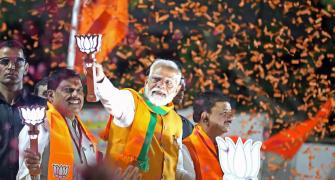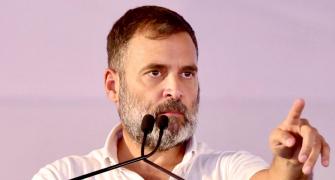Even as the Congress is all set to form a government with the help of the Left parties at the Centre, the Indian industry has drawn up a list of demands.
FMCG
A focus on the agro sector to put more purchasing power in the hands of consumers and rationalisation of taxes are the two main demands of the fast moving consumer goods industry. The industry's demands come in the face of sluggish growth in the sector and shrinking margins.
The FMCG sector is critically depended on rural income. It ranks as the fourth largest sector in the Indian economy with a market size close to Rs 85,000 crore (Rs 850 billion) and the rural segment contributes over 50 per cent to the total market. The fortunes of the FMCG sector largely track the fortunes of the farm sector.
Says Manish Goenka, director of the Kolkata-based Emami group of companies, "The FMCG sector is very price sensitive and its consumption is largely mass driven. If the government gives a thrust to the farm sector and which in turn creates jobs in the rural areas, the spending power would increase. This in turn would stimulate demand for FMCG products.
Further creation of jobs in the rural sector would stop migration to the urban areas and increase the market for FMCG products in these areas.
A prolonged slowdown in demand had negatively impacted the top line growth of companies. Also, the recent price cuts in some key FMCG categories has also impacted the bottomline. The sector has also been adversely impacted by a shift in consumer buying behaviour, which saw the consumer's rupee gravitate towards consumer durables, automobiles, housing and other categories such as travel, leisure etc. This is because of better financing options available to consumers.
Another factor is that branded products made by the corporate sector are at a price disadvantage because they carry the full burden of central, state and local indirect taxes. The informal sector which is able to avoid at least some of this burden, is thus in a position to offer increased competition.
The various taxes add to the cost of the product and account for over 25 per cent of the maximum retail price of the product. Surprisingly, raw materials and finished products attract the same import duties (20 per cent).
Says HK Press, executive director and president of Godrej Consumer Products, "The new government should put more purchasing power in the hands of the consumers by lowering taxes. This will enable more disposable incomes so that the products are within the reach of people and thus the market is expanded. Also, we expect the government to rationalise the tax structure in the FMCG sector."
Says an analyst tracking the FMCG sector, "The implementation of a nationwide value added tax system would help the FMCG sector. Also the government should allow foreign direct investment in retailing. If organised retailing picks up it would lead to increased consumerism."
Grocery accounts for the second largest share of organised retailing to Rs 1,829 crore (Rs 18.29 billion), while 'eating out' accounts for Rs 1,219 crore (Rs 12.19 billion), and expenses on personal care account for Rs 1,067 crore (Rs 10.67 billion).
Says Shammi Hattangdi, senior manager, AF Ferguson, "The government should give a thrust to the rural sector and increase the per capita consumption of the rural people. This will result in a positive growth for the FMCG sector." AF Ferguson had prepared the background paper for the Confederation of Indian Industry.
An industry source added: "We should explore ways to enhance agricultural productivity through contract manufacturing where our farmers can create agri products for large international food processing companies and export around the world. Today most of our agri produce is wasted due to lack of processing facilities and inefficiencies.
Steel
The steel industry is demanding that the import duty on steel be capped at the existing level of 15 per cent. Further, the industry is also hoping that the government would being down import duty for raw materials.
Senior steel industry sources said, "The new government should look at improvement in logistics and transport. Introduction of big haulage trucks, which can carry a load of 80 tonne, would help a heavy industry like steel to grow." As per the existing transport policy, trucks carrying above 35 tonne were not permitted.
The Indian Steel Alliance - the association of the five largest steel companies in the country - has said, "Changing world market dynamics may result in the Indian steel industry being faced with the threat of cheap imports. We hope that the new government would provide adequate protection to the domestic steel industry and not bring down the import duty on steel any further from the current 15 per cent level." The Steel Authority of India, Tata Steel, Essar Steel, Jindal Iron & Steel and Ispat Industries form the Indian Steel Alliance.
Meanwhile, the ISA has also asked the government to resume duty entitlement passbook benefits on steel exports to enable the industry to become globally competitive. The government had withdrawn the DEPB benefits from March 27 this year.
Power
After the passage of the Electricity Act 2003, the power sector has set out a clear-cut agenda for the new government -- the acceleration of reforms in the distribution sector. The promise of free power to the agricultural sector in Andhra Pradesh by the Congress (I) has however caused considerable concern to the industry.
"The new government needs to accelerate the reforms in the distribution sector, which is vital for ushering consumer choice and competition. At the same time, we can learn from the experiences of other countries including Argentina, US, UK and avoid some of their mistakes," Mohan Gurunath, vice-president of Tata Power, said.
Another area of concern for the industry is taxes and duties. "Taxes and duties account for almost 25 per cent to 30 per cent of the tariff. Here again the new government could consider the tax regimes adopted for the power sector growth in the neighboring countries which have a tax-free regime," he said.
Rationalisation of the tariff structure is another area of concern for the power industry. "Due to the passage of the Electricity Act 2003 adequate steps have been taken in the liberalisation of the generation and transmission sector of the industry. However tariff rationalisation is in the realm of the state governments. This is where the pronouncements in certain states by politicians is causing concern," said Navin Wadhwani, assistant director with investment bank N M Rothschild & Sons (India).
Rothschild is extensively involved with power companies in India and has been mandated by the financial institutions to help find a solution to the Dabhol imbroglio.
Traditionally, the ailing state electricity boards have been charging higher tariffs to industrial consumers to cross subside domestic and agricultural consumers. State governments are moving towards phasing out this cross subsidy and that is the reason why promises like delivering free power to farmers is causing alarm bells to ring.
Telecom
Telecom companies want a rationalisation of duties and a lowering of the service tax in line with the global norms in order to reach the mobile users in the country.
The demand comes against the backdrop of a near 40 per cent dip in the mobile subscriber base in April 2004. Although the country has a 180 million addressable mobile population, service providers are unable to reach low-end users as they are unable to fund the high cost of infrastructure considering the very low average revenue per user.
TV Ramachandran, director general, COAI said, "This will be a golden opportunity for the new government to roll out the second phase of reforms in the telecom sector which are important as the market has already plateaued."
He pointed out that the new government can do two things -- allow sharing of infrastructure with the state-owned Bharat Sanchar Nigam and lower duties and levies.
Elaborating on duties and taxes, Ramachandran pointed out that the government should look at "the high burden on service provider, almost 33 per cent, on account of licensing fee, revenue sharing, spectrum usage charges and service taxes. By lowering these high levies, it will further benefit the common man by way of lower tariffs."
Ramachandran pointed out that any reforms in this sector will benefit the common man. "We have seen that the first phase of reforms has resulted in tariffs crashing by almost 90 per cent," he added.
Sandip Das, executive director, Hutchison Max Telecom, said, "The economic reforms which include telecom, are irreversible. While a stable government at the Centre will continue with the pace of reforms, a fractured coalition government will stray away from decisive changes."
A promoter of a leading service provider said, "The government should ensure the financial viability of the telecom sector. It should also look at increasing teledensity in the country".
Cement
The cement industry too is demanding the lowering of import duties on a key input, coal.
A K Jain, executive director, The Associated Cement Companies, adds, "We would want the new government to continue its thrust on infrastructure and support housing finance. Also the movement of coal through rail should be better facilitated, along with bringing down the import duty on coal for the cement industry."
Anil Singhvi, executive director, Gujarat Ambuja Cements, said, "The cement industry is one of the oldest industries, therefore, we do not require any major reforms. However, the new government should focus on economic growth and infrastructure will have a vital role to play in the coming years."






